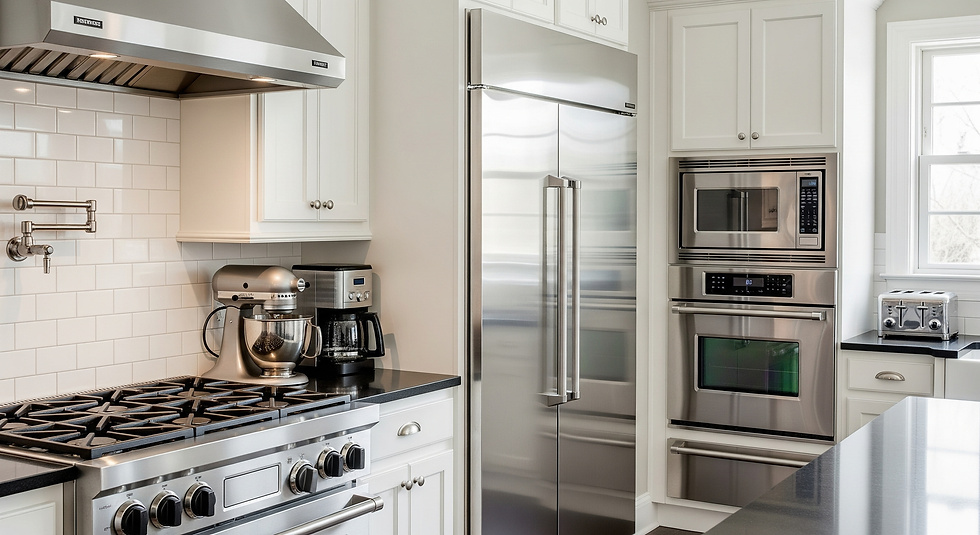Industrial Kitchen Appliances That Redefine Professional Cooking
- Aarav Reddy
- Oct 21
- 3 min read
For professional kitchens, efficiency, consistency, and reliability are non-negotiable. That’s why sourcing the right Industrial Kitchen Appliances is essential for restaurants, hotels, and catering businesses. High-quality industrial appliances aren’t just larger versions of household equipment—they are engineered to withstand heavy use, maintain precise performance, and optimize workflow in demanding environments.

Why Industrial Appliances Are Different
Unlike consumer-grade equipment, industrial kitchen appliances are designed for continuous, high-volume operation. Key differentiators include:
Durability: Constructed with heavy-duty materials to withstand frequent use.
Performance consistency: Maintains temperature, speed, and output for long hours without compromise.
Energy efficiency: Optimized for commercial operations, balancing performance with operational costs.
Safety standards: Built with commercial safety certifications to protect staff and ensure compliance.
For professional kitchens, these features translate into faster service, consistent dish quality, and reduced downtime—critical factors for customer satisfaction and profitability.
Core Industrial Appliances for Professional Kitchens
Professional kitchens rely on a variety of industrial-grade equipment. Some essential categories include:
Commercial Ovens and Ranges
Industrial ovens and ranges maintain precise heat distribution, allowing chefs to cook large quantities evenly. They are designed to handle high-capacity trays, multiple cooking racks, and prolonged operating hours.
Heavy-Duty Mixers and Food Processors
Mixing and processing in bulk is faster and more consistent with industrial mixers. From dough to sauces, these machines reduce manual labor and ensure uniform results.
Refrigeration Units and Freezers
Large-capacity refrigerators and freezers are crucial for maintaining food safety standards. Industrial refrigeration units offer precise temperature control and ample storage for perishable ingredients.
Dishwashing and Cleaning Equipment
Commercial dishwashers and sanitizers save time while maintaining hygiene. Their high-capacity cycles ensure kitchens stay clean and comply with health regulations.
Specialized Appliances
Industrial kitchens often require blenders, fryers, steamers, and grills designed for continuous use. Choosing the right equipment depends on menu requirements and workflow needs.
Benefits of Investing in Industrial Kitchen Appliances
Industrial appliances are more than an upfront investment—they deliver long-term operational value:
Efficiency: Handle larger volumes with less time and labor.
Consistency: Produce uniform results, essential for professional standards.
Reduced Maintenance: Built for durability, reducing replacement frequency.
Cost Savings: Energy-efficient models lower utility expenses over time.
Compliance: Meet commercial safety and hygiene standards, reducing risk of violations.
How to Select the Right Industrial Appliances
Selecting the right appliances requires aligning equipment with operational needs. Consider:
Capacity Needs: Match equipment size and output with kitchen volume.
Workflow Integration: Ensure appliances fit seamlessly into existing kitchen layout.
Supplier Reliability: Source from manufacturers or suppliers with proven industrial expertise.
Warranty and Support: Long-term maintenance and replacement policies safeguard investment.
Energy Efficiency: Look for appliances that minimize operational costs while supporting sustainability goals.
Real-World Applications
Professional kitchens worldwide have leveraged industrial appliances to improve operations:
Hotels and Resorts: Large ovens, walk-in refrigerators, and high-capacity dishwashers streamline service for hundreds of guests daily.
Catering Businesses: Industrial mixers and prep equipment reduce manual labor, enabling teams to handle large events efficiently.
Restaurants with High Turnover: Durable fryers, grills, and ovens ensure consistent quality and speed during peak hours.
These examples show that industrial-grade appliances are essential tools, not just optional upgrades.
Future Trends in Industrial Kitchen Appliances
The industry is evolving to meet modern demands:
Smart and IoT-enabled appliances: Remote monitoring, automated alerts, and usage analytics improve operational control.
Sustainable designs: Energy-efficient ovens, induction ranges, and eco-friendly materials reduce operational costs and environmental impact.
Modular and scalable systems: Appliances that can adapt as kitchen needs grow, allowing businesses to expand without major equipment overhauls.

Conclusion
Investing in Kitchen Appliances is essential for any professional kitchen that values efficiency, consistency, and safety. By selecting durable, high-performing, and energy-efficient equipment, businesses can streamline operations, maintain high culinary standards, and achieve long-term cost savings. For commercial kitchens, industrial-grade appliances aren’t just tools—they are the backbone of success.
FAQs
1. What makes an appliance “industrial” compared to household equipment?Industrial appliances are built for continuous, high-volume use, with durable materials, consistent performance, and commercial safety certifications.
2. How do industrial kitchen appliances save costs?They reduce labor, improve efficiency, extend appliance lifespan, and lower energy consumption, resulting in long-term savings.
3. What should businesses consider when choosing industrial appliances?Capacity, workflow integration, supplier reliability, warranty, and energy efficiency are key factors.
4. Are industrial appliances suitable for smaller commercial kitchens?Yes, modular and compact industrial appliances can meet smaller volume requirements without sacrificing performance or durability.



Comments